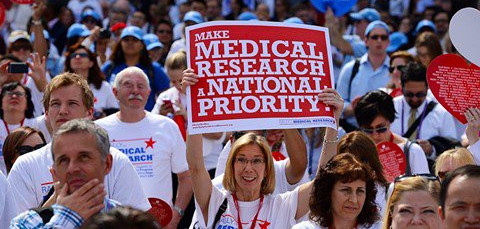Advocacy organizations for dozens of conditions, medical professionals and students, and people living with cancer, HIV, Alzheimer’s and other diseases gathered this week in Washington, DC, to ask legislators to make funding for medical research a national priority.
Thank you to all the advocacy groups who are rallying with us at the hill today! Let’s have a great day on the hill. pic.twitter.com/Zf4sxpPGdP
— Rally Med. Research (@RallyForNIH) September 13, 2018
Organized by American Association for Cancer Research, this was the fifth annual Rally for Medical Research, which calls on policymakers to increase funding for the National Institutes of Health (NIH) and aims to raise awareness that investment in biomedical research leads to “more progress, more hope and more lives saved.”
Early career researchers at the #RallyMedRes advocating for robust and sustained investments in science research funding! It’s up to us to stand up for science and we thank Congress for the support these past 3 years and look forward to more! pic.twitter.com/SI6zwTAZKo
— Kristin Anderson (@neuronerdKris) September 13, 2018
Participants in the national day of action descended on Capitol Hill to ask their representatives and senators to support—or thank them for supporting—generous research funding.
Scenes from the #RallyMedRes kickoff. Thank you to @RoyBlunt @PattyMurray and @KevinYoder for all that you do to support biomedical research and the #NIH! #FundNIH pic.twitter.com/cZRXjEFkh5
— AdHocGrp for Med Res (@fundNIH) September 13, 2018
As the New York Times recently reported, legislators from both parties rejected President Donald Trump’s effort to deeply cut the NIH. In fact, “lawmakers from both parties have joined forces to increase spending on biomedical research—and have bragged about it.”
The Senate Appropriations Committee recently approved a bipartisan bill that provides $36.1 billion in NIH funding for the next fiscal year, while the House Appropriations Committee offered a $1.1 billion increase, according to the New York Times. Legislators expect that the final amount will be closer to the higher Senate figure.
The House and Senate are racing to complete the 2019 appropriations process by the end of the current fiscal year on September 30, but most Capitol Hill watchers predict that this is unlikely to happen, requiring temporary stopgap measures.
Today 300+ national organizations are participating in the Rally for Medical Research in Washington DC with the hope of increasing @NIH @theNCI funding for medical research. #RallyMedRes @RallyForNIH #CancerResearchSavesLives Take action: https://t.co/yKmnmhnP2E pic.twitter.com/TipL2r5Gjp
— UChicagoCancerCenter (@UCCancerCenter) September 13, 2018
Leading national cancer organizations, including the American Association of Clinical Oncology, the American Cancer Society Cancer Action Network, Damon Runyon Cancer Research Foundation and Society for Immunotherapy of Cancer, as well as dozens of advocacy groups for specific cancers and major cancer centers across the country, took part in the day of action, emphasizing the need for increased funding to realize the promise of recent developments in precision medicine and immunotherapy.
We’re proud to be at the @RallyforNIH reception supporting NIH funding #FundNIH #RallyMedRes https://t.co/9SX32ifPK0
— ASCO (@ASCO) September 12, 2018
HIV/AIDS advocacy groups, including AIDS United, amfAR and the HIV Medicine Association (HIVMA), also took part. Although HIV is comparatively well funded on a per capita basis, advocates emphasize that HIV research continues to advance our understanding of other conditions.
Did you know that HIV/AIDS research at the @NIH has led to numerous advances in many other fields of medical research? This is one of the many reasons why we #RallyMedRes. Learn more: https://t.co/HnjOhCrm6M”
— Rally Med. Research (@RallyForNIH) August 29, 2018
Looking beyond the NIH, HIVMA and the Infectious Diseases Society of America called attention to the need for more funding for the Centers for Disease Control and Prevention (CDC) to address the ongoing surge in sexually transmitted infections. Likewise, the American Association for the Study of the Liver expressed concern that the proposed budget does not include a significant increase for the CDC’s Division of Viral Hepatitis, given the spike in viral hepatitis cases resulting from the opioid epidemic.
From AASLD News: “Congress Comes Back To Look for the Exits” https://t.co/4iq0Bn6hT7 #publicpolicy #NIH @NIH @cdchep #hepatitis #CDC
— AASLD (@AASLDtweets) September 13, 2018
Those who did not take part in the Rally for Medical Research in Washington can still participate by contacting their representatives and adding their voice to the call for increased funding for biomedical research and health care.
Thanks to all who stormed Capitol Hill for #RallyMedRes Hill Day.
— SWOG Cancer Research (@SWOG) September 13, 2018
New cancer treatments come from clinical trials.
Clinical trials come from basic medical and scientific research.
Basic science is funded by tax dollars.
Grateful for 62 years of support from @theNCI and @NIH https://t.co/tBPrc8kLOU
Click here to learn more







1 Comment
1 Comment